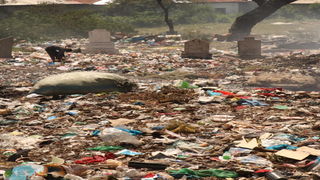
Garbage mounds at Kongowea cemetery in Mombasa. Families who have buried their departed kin at the graveyard want the area protected by fencing to stop illegal activities
| Winnie Atieno I Nation Media GroupMombasa
Premium
Cemeteries turned into dumpsites in Mombasa
The dead in Mombasa are not sleeping in peace, as graveyards are choked with garbage.
At the Kongowea and Manyimbo public cemeteries, garbage collectors have taken over the graveyards to sort out their waste.
But for families whose relatives lie in the cemeteries, the pain is too much to bear as they cannot find the graves of their loved ones.
At the Kongowea cemetery, traders have also taken over the graveyards to sell their merchandise, which is paraded on top of graves.
“The market is full. Where do you want me to sell my merchandise? Tell the county government to allocate us space at the market if they don’t want us to sell in this graveyard. We must earn our living,” said Jane Sawe.

Garbage mounds at Kongowea cemetery in Mombasa. Families who have buried their departed kin at the graveyard want the area protected by fencing to stop illegal activities
Ms Sawe, who sells clothes on a grave, says she’s not afraid of any spirits as she’s accustomed to the cemetery life.
Next to her is a house that sits on five graves. Its former owner revealed how it came about.
“I was duped and bought this land in the 1990s. I decided to build a rental. But later, I sold it. I was too scared to live in the house. This graveyard was so big but thirsty grabbers started subdividing and selling it,” said the man, who requested anonymity.
He wondered why the county government allowed land grabbers to take over the graveyard.
Half of the cemetery, which borders the Kongowea market, has residential houses and has become a garbage dumping site and trading zone.
The Nation found some of the garbage collectors dumping waste on the graves before they were sorted.
Certified environmental inspector Benson Wemali described the garbage dumping as a serious crisis, polluting the area and causing respiratory diseases.
“Mixing dead bodies and solid waste will cause a catastrophe in Mombasa. You aren’t supposed to dump anything in a cemetery. It’s not a dumping site,” said Mr Wemali, a former official with environment watchdog Nema.
“We have designated dumping sites, why dump in a cemetery? Worldwide, cemeteries are protected areas by both the people and the government.”
He accused the county government of laxity.
“The department of waste management is sleeping on their job. This means anybody can dump waste anywhere! A lot of burning takes place in those dumpsites. Criminals can kill people and burn the bodies in such places,” he said.
Mr Wemali cited Muslim cemeteries as those that are well protected, with management and clear signage.
“The faithful know the importance of respecting the graveyards,” he said.
Bruno Mahoka, 65, whose wife, parents and seven other relatives lie at the cemetery, was worried that he could not find his relatives’ graves, which were buried under waste.
“On November 2, I always come here for my relatives’ memorial but I’m worried that this year will be different because of the garbage. I cannot trace four of my relatives’ graves,” he told the Nation.
He said he had spoken with relevant officials but the situation is still the same.
“Some of the graves have been destroyed by trucks ferrying the waste. They are now burning the garbage, and we are worried the fire might catch the bodies although they are five feet under,” he said.
Kongowea resident Sheila Machika, 28, who went to check on her brother’s grave, was sad that she could not find it.
“I buried my brother in 2016, but I cannot trace his grave. I rushed to the graveyard when I heard that a tractor had destroyed many graves,” she said.
“If we had money we would have ferried our brother to our rural area in Kakamega but we are poor. Let them announce if the cemetery is now a dumpsite.”
At Manyimbo, the situation is not any different. A small section of the cemetery is filled with garbage.
“We should respect the dead. A graveyard shouldn’t be a dumping site. What is happening in Mombasa is sad. The dead should rest in peace, not in the garbage,” said Tudor resident Paul Opiyo.
This is happening as the county government grapples with proper waste disposal.
Mr Wemali said the county has not given priority to proper garbage disposal.

Garbage mounds at Kongowea cemetery in Mombasa. Families who have buried their departed kin at the graveyard want the area protected by fencing to stop illegal activities.
“The situation will worsen with the ongoing rains and diseases. If I was to rank areas dealing with a serious garbage menace, I would start with Likoni, which is the worst. I sympathise with them. Then there is Kisauni and lastly Changamwe,” he said.
He said the county lacks the manpower, capacity and tools to deal with garbage.
“They are using the old system. Worldwide people have embraced modern ways of dealing with waste. In Mombasa, the county is collecting garbage using trucks and dumping in Mwakirunge, which is almost full,” he said.
Contacted for comment, Environment, Energy and Waste Management executive Godfrey Nato said the county was planning to clear the garbage and fence off the areas.
“We had a transfer station at VOK, and asked waste collectors to organise themselves as a working group but the place became unmanaged and we decided to shut it,” he said.
“Then the same individuals started dumping waste on the edge of the Kongowea cemetery. When we realised it, we started mopping them out.”
The county has asked the inspectorate department to deploy enforcement officials at the graveyard to deal with the collectors illegally dumping waste in the area.





